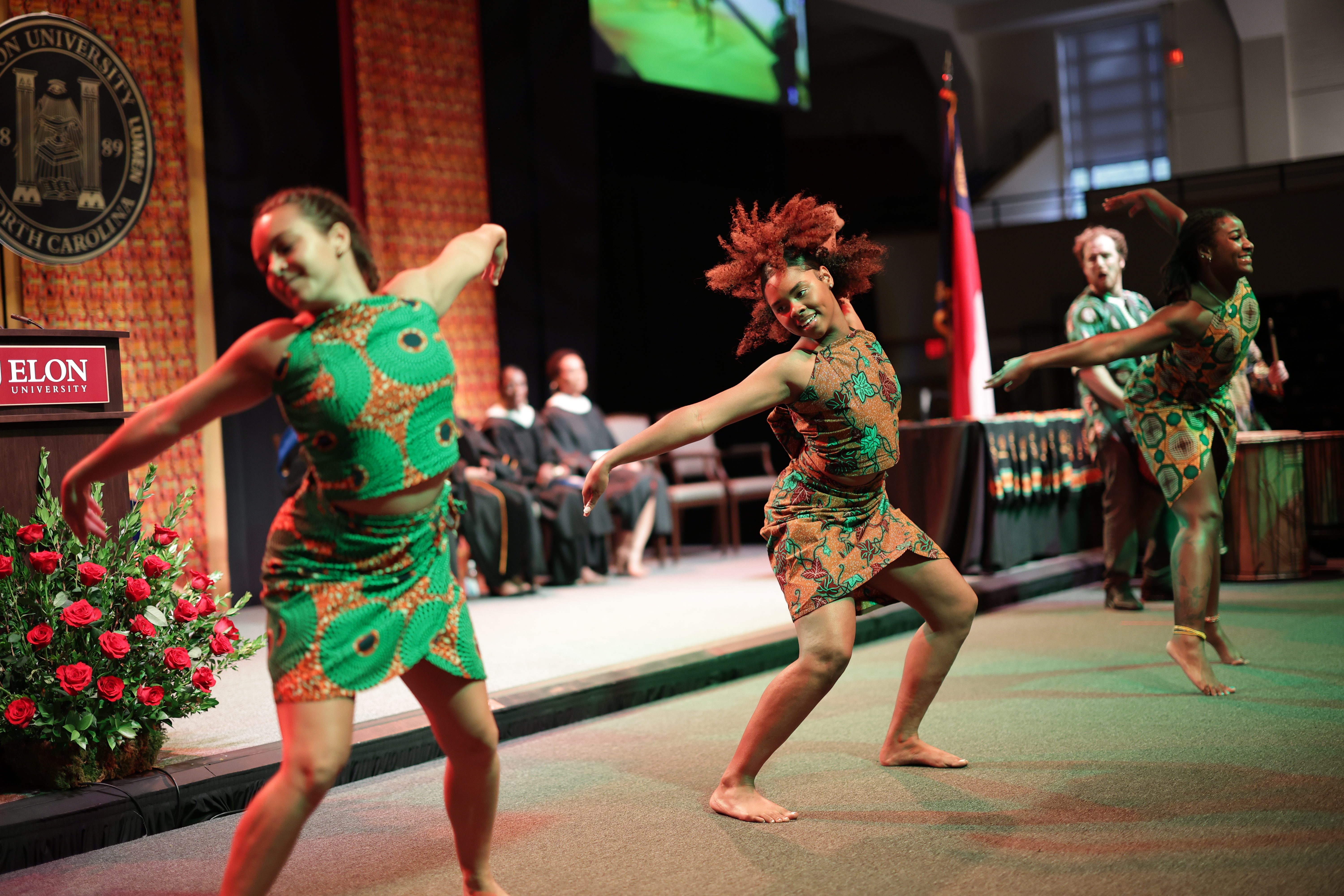The annual ceremony highlights the achievements of graduating Elon students who recognize their African roots.
Elon students were joined by their friends and family members gathered in Alumni Gym Thursday night for the eighth-annual Donning of the Kente ceremony to celebrate the achievements of graduating Elon students who recognize their African roots.
In her charge to the students on the day before they received their diplomas, Professor Buffie Longmire-Avital drew from the symbolism behind the popular song “Blackbird,” written by The Beatles and inspired by the civil right movement of the 1960s. Longmire-Avital, director of the Black Lumen Project at Elon, encouraged the students to fly on even in the darkness, even when they may feel lost and alone.
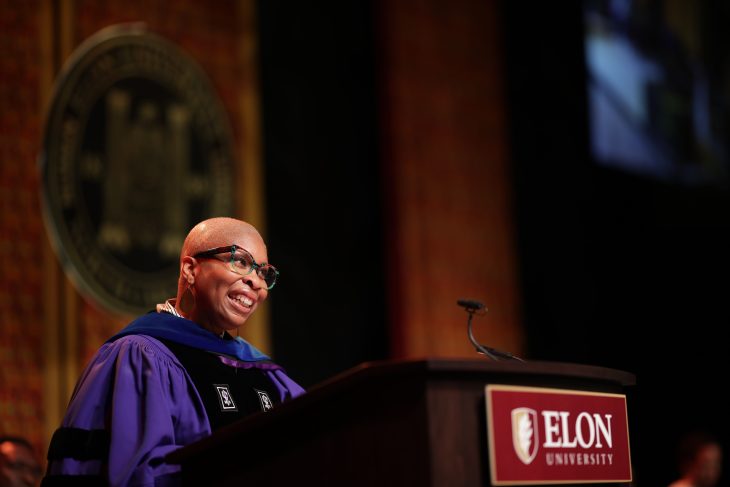
“The light you want to follow to your destination will never be found out there. It instead emanates from within you,” Longmire-Avital told the more than 70 students participating in the ceremony. “It is the culmination of an ancestral flame that while terrifying to some, it will not, it cannot be extinguished.
“Class of 2024, as you seize this moment to arise, to take flight through yet another uncertain dark night, remember, you need not chase the light when you are it. Graduates — congratulations, and burn bright.”
Each graduate received a handwoven kente cloth stole imported from West Africa. The graduating students will wear their stoles at the 134th Commencement on Friday, May 24, for inspiration and to honor, celebrate, connect and reflect on the collective heritage and communal struggles and successes.
The kente cloth symbolizes and celebrates prestige in many African societies dating to the 12th century Africa in Ghana. Worn during ceremonial events by royalty and important figures of state in Ghanaian society, the kente cloth is a visual representation of African history, philosophy ethics, oral literature moral values, social code of conduct, religious beliefs, political thought and aesthetic principles.
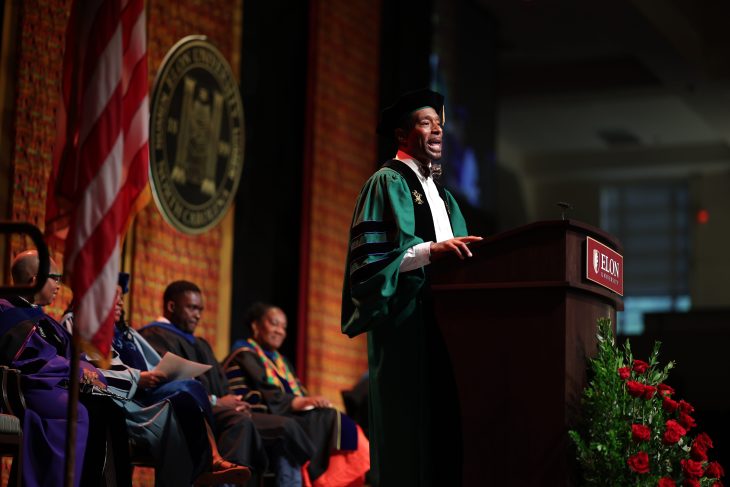
“Here we are — together, in community to experience Black joy, empowering every soul assembled here, regardless of your skin tone, your heart’s attraction, your generation, your spiritual connection or any other marker that might separate us,” said Randy Williams, vice president for inclusive excellence and associate professor of education, in his welcome to those gathered.
Williams noted that the country recently marked the 70th anniversary of the historic U.S. Supreme Court decision in the Brown v. Board of Education of Topeka, Kansas case that outlawed the prevailing “separate but equal” standard that allowed for segregation in schools. “Here we are, ready to witness the conferral of degrees for the next class of Black Elon leaders who, like the leaders of the past, are destined to do their own landmark work,” Williams said. “Here we are, ready to rejoice in the graduates’ accomplishments and support their promise for a better world.”
University Chaplain Kirstin Boswell, in her invocation, encouraged those gathered to acknowledge their common humanity and challenged them to leave this ceremony with a commitment to building community and being of service.
“We come together in celebration, knowing that it is only through collaboration and mutuality that we can ensure that every promise that our ancestors might have held for us is met, every hope that may have resided within them is given room to take flight and every dream they might have held for us is fulfilled,” said Boswell, who is dean of multifaith engagement. “Let us go realizing that it is only through great perseverance tempered with great love that we can do the work to which we are called. Whatever pathways we take from this place, may they serve to affirm our common humanity, and work to construct the beloved community.”
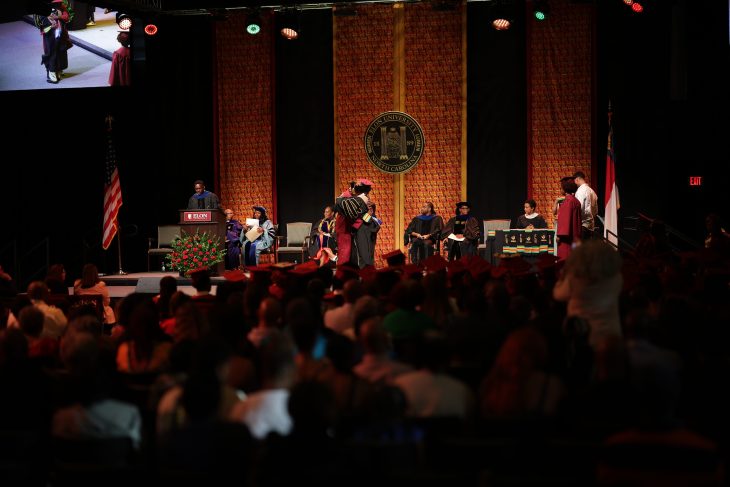
President of the Elon Black Alumni Network (EBAN) Alex Bohannon ’17 officially welcomed the Class of 2023 graduate to the network. Working to unite and represent the interest of Black alumni, EBAN actively promotes and sustains alumni contributions to the university and connects Black students with each other. Bohannon shared the meaning behind a symbol connected with a Ghanaian tribe. The symbol literally means fence, but it symbolizes love, security and safety, he said.
“As we embark on the next phase of your journey as alumni, recognize that you now stand as another pillar in the protective fence safeguarding Elon’s Black students, offering support, advocacy and a secure environment,” Bohannon said.
Assistant Director of Alumni Engagement La’ Tonya Wiley ’97 offered a welcome to these newest Elon alumni, explaining that each would receive their stole from someone who has impacted their journey, with a series of Elon faculty members reading a special message that each had crafted for their Elon student. The messages were from mothers, fathers, sisters, brothers, faculty and staff mentors and others, offering words of encouragement and pride in what the students have accomplished.
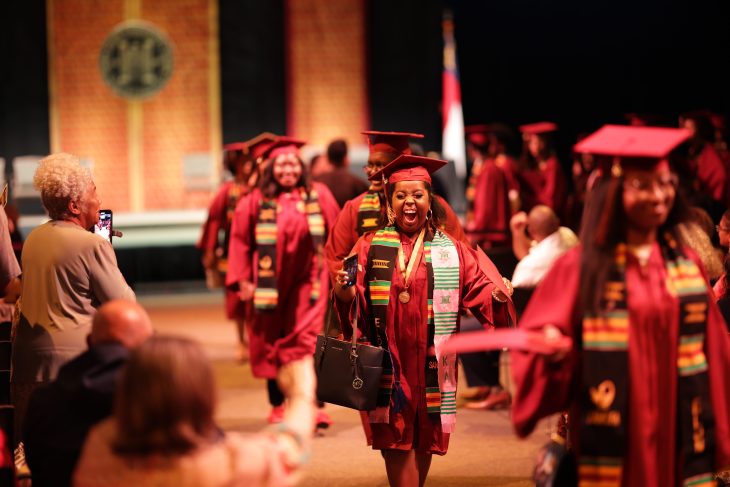
In her closing remarks, Longmire-Avital commended the students on navigating challenging environments and making their educational experiences their own. “As blackbirds, we move through the unknown, sustained by our weather-tested belief that the night will give way to the light of day, which will confirm that we have in fact ended up where we were meant to be,” she said. “It is a powerful act of faith that we must engage.”



